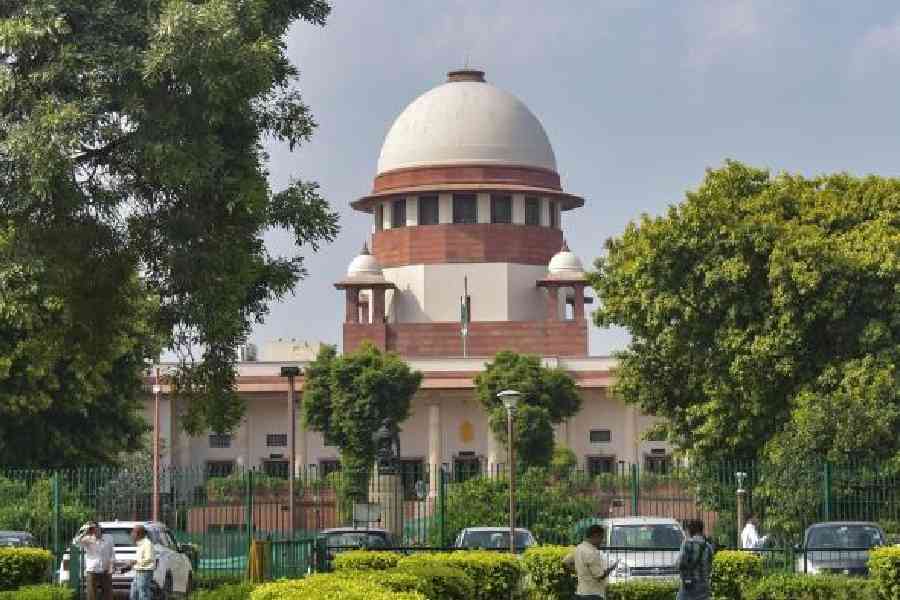The Bengal government on Tuesday informed the Supreme Court that the state had decided to take a fresh exercise to classify potential OBC beneficiaries after Calcutta High Court had last year quashed the categorisation of 77 communities as Other Backward Classes for reservation in jobs
and education.
Following the intimation given by senior advocate Kapil Sibal on behalf of the state, a bench of Justice B.R. Gavai and Justice Augustine George Masih posted the government’s earlier special leave petition (SLP) challenging the impugned high court judgment for disposal in July.
Justice Gavai heading the bench orally remarked that if the state decided to carry out a fresh survey, then the appeal filed by the Bengal government would become “irrelevant”.
The high court had on May 21, 2024, quashed the Bengal government’s order that had classified 77 communities as OBCs. Several of those communities were of Muslims. The order was challenged by other communities as being unconstitutional.
On Tuesday as soon as the matter came up before the Supreme Court, Sibal said: “…It has been decided by the government that a fresh exercise will be done as to who are backward. The entire exercise may be over in three months. This matter may therefore be taken up after three months.”
Justice Gavai then remarked: “If the entire exercise is redone, and after that, fresh reservation is provided for, and nobody is aggrieved, then this question will become irrelevant.
Sibal agreed that if, after the fresh exercise, any further objections were raised, then the aggrieved person could always approach the court. He requested that the matter be posted for hearing in July, which was conceded by the bench.
The bench then directed: “Learned senior counsel Mr Kapil Sibal, appearing for the Petitioner states that West Bengal Commission for Backward Classes is undertaking an exercise of examining the issue of backwardness afresh. He further submits that the same will likely take three months. In view of the statement… Post the matter in July. Needless to say, the said exercise would be without prejudice to the rights of either of the parties.”
In a lighter vein, Justice Gavai observed: “So today, we have saved ourselves (judges) from a heavy matter…”
The court was referring to the multiple petitions/cross petitions and applications filed against or in support of the high court judgment.
On August 5 last year, the top court had directed the Mamata Banerjee government to file an affidavit explaining the consultation process adopted to justify the classification.
It had asked the state to explain the nature of the survey conducted by the government in determining the beneficiaries; whether there was a lack of consultation with the West Bengal Backward Classes Commission and the specific nature of the survey as regards inadequacy of representation and social backwardness of the communities, to justify the classification.
The Supreme Court had, however, refrained from passing any interim stay on the high court judgment despite the state pleading that the recruitment process in Bengal had come to a standstill, although all those already appointed stood protected from being removed.
The Bengal government had also argued that the 77 communities had already featured on similar lists prepared by the Centre and various other states.
The bench was dealing with the Bengal government’s appeal assailing the high court’s judgment to quash the classification of 77 communities by the State under the “The West Bengal Backward Classes (Other than Scheduled Castes and Scheduled Tribes) (Reservation of Vacancies in Services and Posts) Act, 2012,” as being illegal
and unconstitutional.
The high court had, however, clarified that it was not passing any order on the state’s decision to classify 66 classes of OBCs that were undertaken in 2010 as the same was not challenged by the petitioner who had confined the challenge only to the classification of 77 communities under the 2012 legislation.
The high court had asked the State Backward Classes Welfare Department to place a fresh report, in consultation with the West Bengal Backward Classes Commission, before the Assembly with a recommendation for proper classification of the OBCs based on the requisite survey.










